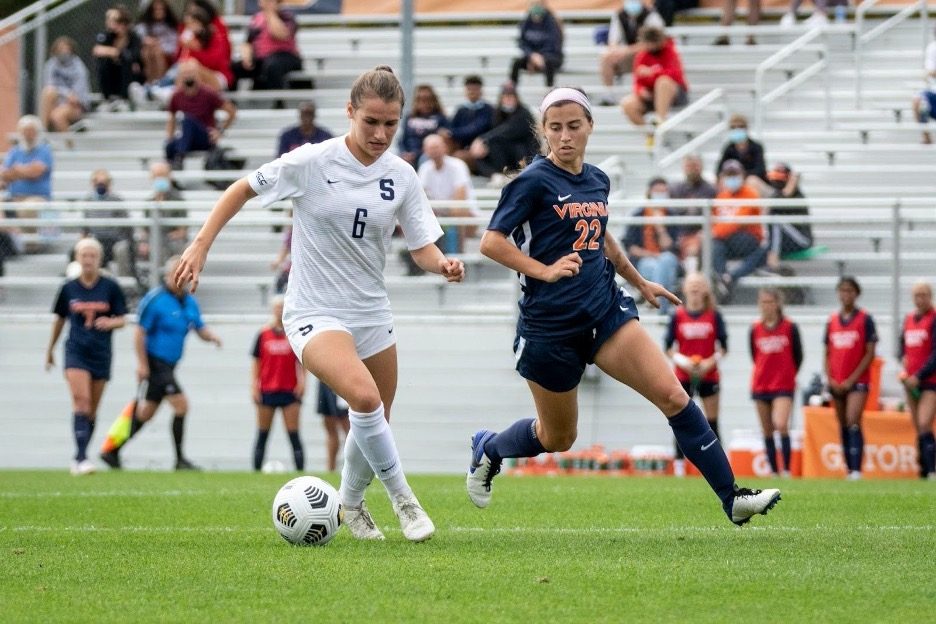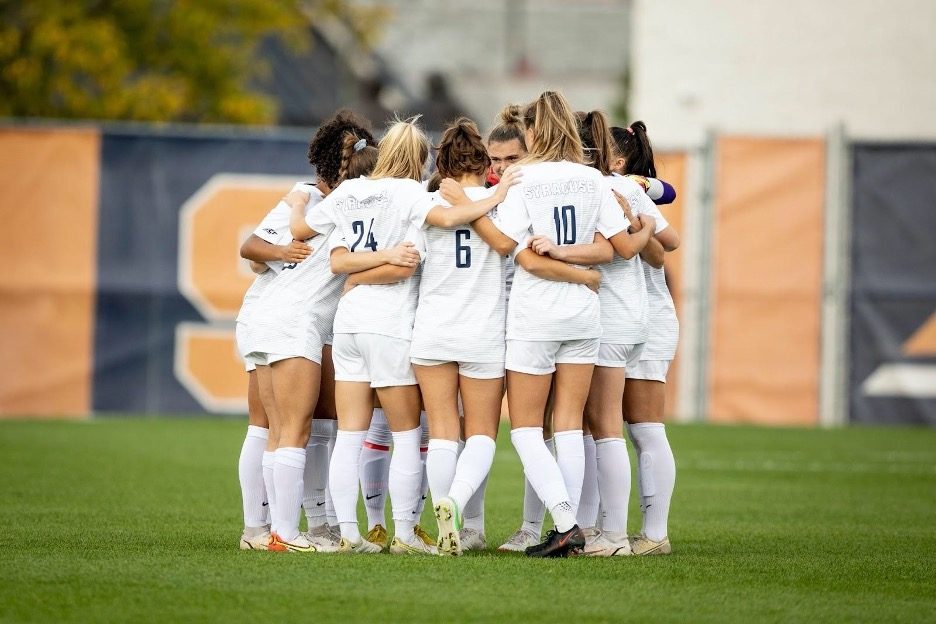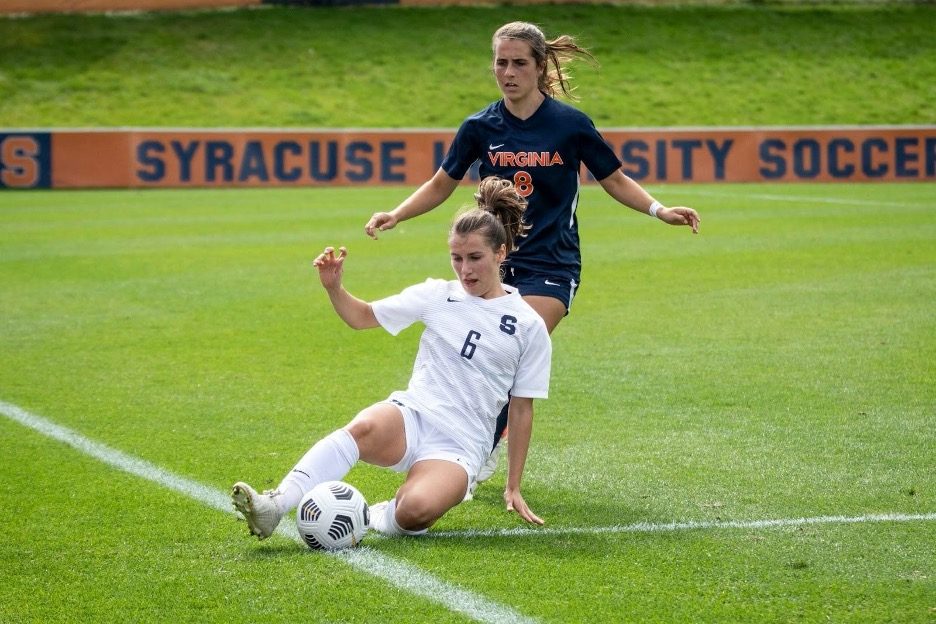Pauline Machtens’ journey from Leverkusen to Syracuse women’s soccer
Pauline Machtens' journey from Germany to Syracuse women's soccer

I first met Pauline Machtens, the freshmen midfielder for the Syracuse women’s soccer team, in Manley Fieldhouse. She looked like an ordinary American college kid, dressed for supreme comfort above all else—baggy sweatpants, worn-out UGG slippers, and a long sleeve dri-fit Syracuse track top—except she isn’t ordinary and she isn’t American. Machtens, one of the Orange’s best players, is from Leverkusen, Germany.
“It’s everything I wanted it to be when I came here,” Machtens said. “I’m so happy this happened to me.”
Machtens has a friendly demeanor and an open, honest way about her that belies her status as a star athlete. She spoke with a German accent, but she’d clearly picked up on the Americanisms of college life. She never once called it “football” (in German you say Fußball) and regularly used words like “cool”, “sucked”, and “hyped.” She was generous with her time; if she ever felt like there were other things she’d rather be doing, she was polite enough not to give that impression.
Before joining the Orange this season, Machtens played for the U-18 teams of Bundesliga club Bayer Leverkusen and the German national team. She’s part of a growing trend in Division I sports, particularly soccer, of international players in the NCAA. According to NCAA research, 258 athletes, or 11% of Division I women’s soccer players, were from overseas in 2018. Twenty-two came from Germany, making it the third most represented country in women’s collegiate soccer after Canada (106) and the United Kingdom(38).
It’s an NCAA-wide trend that the Orange have only helped accelerate. Eight international players from four different countries (Belgium, Canada, Germany, and Russia) were represented on Syracuse’s roster in the 2021 season—all of which was by design, as part of head coach Nicky Adams’ recruitment strategy. Adams wanted Machtens to join the team because she knew that a player from Europe would have a different relationship with soccer; one with a profoundly professional approach to the daily routine of an athlete.
“The thing I love about internationals is that they bring just a passion for the game,” Adams said, stretching out the “o” in love. “Soccer is everything to [Pauline] and winning matters. She brings that passion on a daily basis to our team whether it’s a practice, a lift in the weight room, or a game. The same competitive fire is always there.”
There was a self-admitted, month-long adjustment period for Machtens when she first arrived in the United States. She missed her family and worried about meeting new friends because she was “scared to talk,” unsure about her English. Eventually, she became so comfortable that in October, when she was back in Germany for a training camp with the national team, she “missed everything [in Syracuse].”
Now that she is finally settled into her “second home,” Machtens found a place that’s just like the movies advertised—frat houses, loud Americans and beautiful college campuses. She was so impressed with Syracuse’s grounds that she often FaceTimes her friends in Germany using the back camera so she can show off the university’s manicured lawns and distinct architecture. She’s also found teammates that appreciate her talents and value her past experiences.

Team captain and goalkeeper Lysianne Proulx, a French Canadian from Montreal, was familiar with the challenges Machtens faced moving to Syracuse. She also knew the value that her background would bring to the team.
“Soccer-wise she is just very, very talented,” Proulx said. “She is very technical and has a very good vision of the game and I think those characteristics speak a lot about where she’s from.”
The eye test confirms Proulx’s endorsement. At Orange games, fans can’t help but notice the diminutive midfielder in the number six jersey, who always seems to be doing something good on the field. And, perhaps more importantly, something that’s better than what the other players on the field are doing.
In soccer, it’s easy to spot strikers and wingers, the players who catch the eye with their technique and skills. But midfielders are usually the players who are most integral to their team’s success.
When the ball arrives to her, it settles at her feet. When she plays a teammate into space, they don’t have to break their stride. When she’s pressed, she keeps the ball. When Machtens is in the midst of the frenetic chaos of midfield, she always controls the most important aspect of the game: the ball.
But there’s a reason she plays in the middle of the pitch and not as a forward. Machtens doesn’t just know how to do everything on the pitch—she knows what she should do. That tiny line differentiates the good players from the good footballers. This season, she was Syracuse’s joint-top scorer with three goals. According to SU’s official statistics, she scored those with just six shots on target, 11 fewer than the teammate she finished with tied for the lead.
Machtens doesn’t just have the ability in her feet to make the ball go where she wants, she has the ability in her head to know where that spot even is. Fans see a player who never panics when she’s pressed. A player with the technique to play complex balls at just the right moment to find her teammates. A player who always beats her opponent even though she may not be faster than them. Ultimately, they see a player who is always a step ahead of the opposition even though certain athletic measurables should have indicated otherwise. She’s that rare midfielder who seems to float above the game, suspended on a cloud that whips about the pitch, leaving only the barest of traces on the grass and the slightest droplets of dew on her boots.
It’s no surprise then to hear that a player whose greatest strength is her vision and tactical intelligence says that “sports are all about mental things.” When Machtens was at Bayer Leverkusen, she often wasn’t even selected for the matchday squad, meaning she didn’t suit up for the game with her teammates.
“Watching my teammates playing soccer while I was just sitting in the stands was really hard sometimes,” Machtens said. “You knew you were just practicing for nothing, that was the hardest thing. I know I should be doing stuff for myself but if you can’t compete with the other people, you get really unconfident. That was one of the hardest seasons, or years, I’ve ever experienced.”
Despite playing at a professional club with all of the resources it provided, Machtens knew she wasn’t part of the team’s long-term plans. That acknowledgment weighed on her, and while it never diminished her love for the game, it did cause her to question herself.
“In Germany sometimes I thought, like, why are you doing this,” Machtens said. “It was not fun sometimes.”
It doesn’t matter how perfectly maintained the pitch is if you only use it for practice. It doesn’t matter that you have access to first-team coaches if “you’re afraid of them.” It doesn’t matter if you have access to professional sports medicine if you end up sitting on the bench when you’re fit. No matter how many top-level resources she had at Bayer Leverkusen none of them could make up for the loss of enthusiasm that threatened to derail the pursuit of her passion.
A change of scenery was in order. She had some friends from Germany who visited the United States, all of whom offered glowing reviews about America.
“There was no one who said this is not cool,” Machtens said, laughing. “Everyone said this is the best experience they have ever had. I thought it would be a great opportunity to play soccer and study at the same time. In Germany, you can’t do that. There’s no opportunity to do that. So, I just thought that’s great.”

When asked if she thinks she could have played professionally, Machtens started her answer with a long “umm” before offering a decisive “yeah.” Although, she admitted, probably not at Bayer Leverkusen. But the uncertainty of not “being able to live from soccer” and the excitement of a new experience made college a safe, if still promising, route toward a future as a full professional. Her coach, Adams, on the other hand, was more candid about the scale of Machtens’ ambitions and matter-of-fact about her potential to fulfill them.
“Of course she wants to go and have a professional career,” Adams said.
Adams said a realistic goal for Machtens would be to represent Germany at the upcoming U-20 World Cup in Costa Rica in 2022. Playing at such a prestigious global tournament would be an important next step both for Machtens’ soccer career and the Orange.
To facilitate the move to America, Machtens worked with Wagner & Woolf, an agency that specializes in placing German athletes at American colleges, to set up interviews with “a lot of coaches” who were interested in recruiting her. There were some initial nerves about speaking in English, but all of that melted away when she met Adams over Zoom in December 2020.
“The connection between us was really good right [from] the beginning,” Machtens said.
Adams was clear-eyed about what made her three meetings with Machtens and her father, Stefan, so memorable.
“Right off the bat I was so impressed with Pauline’s maturity and her professionalism and her ability to communicate one-on-one with me,” Adams said. “I think it’s really important to bring players in that have no problem communicating, especially with a head coach. Right off the bat, we hit it off.”
Adams gained a player that offered the team both technical and mental improvements. One who raised both the floor and the ceiling of the team. The first by raising the baseline level of quality in the team, allowing for a more regular commitment to the complex and effective patterns of play that a team can only develop with talented players in its roster. The second, because Machtens is young and a star—because she can, and almost certainly will improve.
But Machtens gained something equally valuable and ephemeral: love. Love for the game, love for the daily improvement that defines an athlete’s life, and love for being a part of a locker room.
Let her tell you in her own words:
“I got the fun back.”





